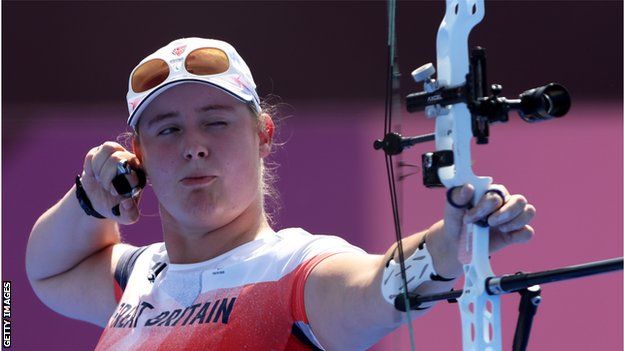Britain's Phoebe Paterson Pine on struggling to deal with Paralympic gold success
- Published

Paterson Pine is studying Sports Coaching and Science at Worcester University
After winning archery gold at last year's rescheduled Tokyo Paralympics, Britain's Phoebe Paterson Pine knew she should probably have been on top of the world.
On her Games debut, aged 23, the Cirencester archer triumphed in the women's compound event - a sweet success after a lifetime blighted by name calling and struggles with her disability.
But the post-Games blues cast a shadow over the Briton who tried archery for the first time aged 12 on a family holiday.
"I struggled really quite bad mentally when I got back from Japan. I just didn't know who I was and what I was doing," she tells BBC Sport.
"People thought what I had done was amazing and I must be on cloud nine. But I just had days when I didn't want to get out of bed because I just thought what was the point?
"It was almost like I was having an existential crisis.
"Going to a Paralympics, you get lots of advice and workshops on things like anti-doping and media training. There isn't any guidance for what happens when you win a gold medal - and it's different for everyone."
Paterson Pine took a break for a month, spending time with family and her boyfriend and indulging in another passion - knitting - but for someone who knows that shooting arrows has a positive effect on her wellbeing, it was difficult.
"I'm definitely doing better now than I was before," she says ahead of her return to competition at this week's World Archery Para Championships (19-27 February) in Dubai, where she aims to add a world title to her memorable Paralympic gold.
"I've started taking anti-depressants, which are really helping to mellow out the ups and downs a bit more.
"I'm also working with a new coach [former world medallist Andrea Gales] who is very experienced and knowledgeable and so supportive. Working with her has completely changed my mindset, so I feel happier in myself.
"I also feel like I've made the right choice when I comes to starting my medication, because it's something I need to do and I'm glad I have done, because it's such a taboo topic."
Paterson Pine beat Chile's Mariana Zuniga Varela 134-133 in the Tokyo final
Paterson Pine's Tokyo gold was achieved the hard way. She missed the 2018 season because of a bone infection in her heel and struggled on her return in 2019 when the initial Paralympic qualification slots were secured.
After the coronavirus pandemic delayed the Games by a year, it gave her a fresh focus and she dealt with her mental health issues to secure a quota spot for Great Britain at the final qualification tournament in July, before then having to wait to see if the place was hers.
In Japan, she faced the challenge of four elimination matches in one morning in a sport where the smallest of margins can make a huge difference, going up against - and beating - GB team-mate Jess Stretton on her way to winning Paralympics GB's only gold in the sport at the Games.
Growing up with spina bifida which left her unable to run, school PE lessons were a particular challenge, coupled with frequent verbal abuse about her condition.
"I was always the last person to be picked on teams and if I didn't get picked I sat out. I hated it," she recalls.
"I knew that people were going to say things about the fact that I couldn't run and someone else was going to have to run more to make up for that. Then I felt bad for those around me and that was wrong.
"I have so many bad memories that I never thought I would ever take part in and enjoy sport.
"So to have found archery and gone to Tokyo and been successful, and also be awarded an MBE, proves that everyone who has ever said anything mean about my disability is just wrong. Look at what I have achieved - disability or no disability.
"I did an interview after Tokyo where I got very emotional over the fact that I have been called so many horrible names throughout my life.
"But of all the things I have ever been called, Paralympic champion is the best."